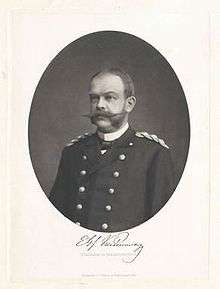Count Erich Kielmansegg
| Hochgeboren Erich Graf von Kielmansegg | |
|---|---|
 Count Erich von Kielmansegg (1900; Heliography by Josef Löwy) | |
| 12th Minister-President of Cisleithania | |
|
In office 18 June 1895 – 29 September 1895 | |
| Monarch | Francis Joseph I |
| Preceded by | Alfred August Fürst zu Windischgraetz |
| Succeeded by | Kasimir Felix Graf von Badeni |
| Personal details | |
| Born |
13 February 1847 Hanover, Kingdom of Hanover |
| Died |
5 February 1923 (aged 75) Vienna, Austria |
Erich Graf von Kielmansegg (13 February 1847 – 5 February 1923) was an Austrian statesman. He served as stadtholder of Lower Austria and short time Cisleithanian Minister-President of Austria-Hungary in 1895.
Biography
He was born in Hanover the son of Count Eduard von Kielmansegg (1804–1879), Minister-President of the Kingdom of Hanover from 1855 to 1862 and himself a grandson of Lieutenant-General Johann Ludwig von Wallmoden-Gimborn, an illegitimate son of King George II of Great Britain. With his father he had to emigrate upon the annexation of Hanover by Prussia after the 1866 Austro-Prussian War and moved to Vienna. Kielmansegg studied Jurisprudence at the universities of Heidelberg and Vienna and entered the Austrian civil service in 1870.
From 1876 he served as Hauptmann ("captain") of the Baden District, Austria and from 1882 as an official of the state governments in the Cisleithanian crown lands of Bukovina and Carinthia as well as in the Austrian Ministry of the Interior. From 17 October 1889 he was stadtholder of Lower Austria, where he carried through the union of Vienna with the suburbs (Greater Vienna), the Vienna Danube regulation and the expansion of the Donaukanal and the Wien River.
After Minister-President Prince Alfred III of Windisch-Grätz had resigned over the language conflict with the Young Czech Party in Bohemia, Kielmansegg, a confident of Emperor Francis Joseph I of Austria, was appointed Minister of the Interior and Cisleithanian Prime Minister on 18 June 1895, though only as an acting officeholder until the implementation of the Badeni government on September 29. He remained Lower Austrian governor until 18 June 1911, however, he had to cope with the rising political power of the Social Democrats and the Christian Social Party under the popular Vienna mayor Karl Lueger.
Retired Kielmansegg died in Vienna from pneumonia, he was buried at the Döbling Cemetery. A born North German he was, with the exception of Chancellor Count Friedrich Ferdinand von Beust, the only Protestant minister of Austria up to this date.
Notes
References
-
 Chisholm, Hugh, ed. (1922). "Kielmansegg, Erich, Count". Encyclopædia Britannica (12th ed.). London & New York.
Chisholm, Hugh, ed. (1922). "Kielmansegg, Erich, Count". Encyclopædia Britannica (12th ed.). London & New York.
External links
- Ottův slovník naučný (in Czech)
- Ottův slovník naučný nové doby (in Czech)
